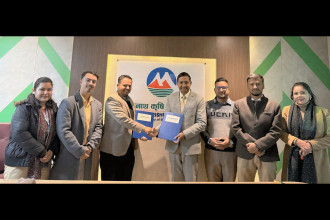
The fourth edition of Himalayan Consensus Summit, an annual event bringing together pioneers, business and financial leaders across the region to forge pragmatic ways to local challenges, concluded on April 2 with six sessions and three presentations. Held at Hotel Himalaya, the Summit was hosted by the Himalayan Consensus Institute, Hong Kong with Nepal Economic Forum as its Secretariat.
The annual Summit stands atop the Himalayan Consensus process that was initiated with the issuance of the Himalayan Consensus Declaration in November 2014. This process symbolises a unique paradigm focused on keeping socio-economic development abreast with environmental conservation in one of the world’s most economically dynamic, environmentally fragile and socially vulnerable regions i.e. the Himalayan region. The process concentrates on Himalayan knowledge and traditions and channelizes the same through the Summit to achieve solutions in the form of concrete outcomes that are pragmatic, policy-driven as well as applicable and adapted by the concerned governments in the region.
With the theme Towards a Shared Future: People | Innovation | Cooperation, the event this year primarily discussed different interventions to realise a secured and sustainable future in the Himalayan region.
The Summit cantered on the emerging concept of Himalayan Circular Economy. In this context, Philippus Wester, Regional Programme Manager-Mountain Knowledge & Action Networks, ICIMOD delivered a presentation on impacts of climate change in the Hindu Kush Himalayan region. Likewise, speakers in other sessions highlighted the much needed transformation towards a prosperous and low-carbon development in the region and its effects on the contemporary developmental issues, particularly in the Himalayan region.
The nexus between migration and development in the Himalayan region was a key topic presented by Pietro Mona, Ambassador for Development, Forced Displacement and Migration, Federal Department of Foreign Affairs, Switzerland during the summit. He reflected on the need of people centric and gender sensitive migration policies. On a similar note, speakers from other sessions also echoed the need of holistic policies that address various aspects of migration, since migration is a multifaceted issue with no direct solution.
As four of the states in the Himalayan region are preparing to graduate from the least developed country status by 2025, one of the presentations in the summit analysed ‘the future of work’. Richard S Howard, Director, ILO Country Office for Nepal stressed that more investments need to be poured into peoples’ capabilities, institutions of work and decent and sustainable work, as we visualize the future of work. In other sessions, speakers delved upon the Himalayan challenges and reiterated that more strong intent is required from the political institutions to resolve these challenges through collaborative initiatives.
Overall, the core of the summit revolved around making people a priority, the need of innovation for sustainable development and sharing the social responsibility as we share a future. In this context, Nepal Economic Forum has embarked on incubating the Himalayan Circular Economic Forum to acknowledge the rising need for discourse around circular economy.
Until date, the Himalayan Consensus Summit has had almost 200 speakers and over 600 delegates participated in the summit. While HCS 2019 had 29 local and international speakers, more than 200 delegates attended the summit.





-1766135582.jpeg)